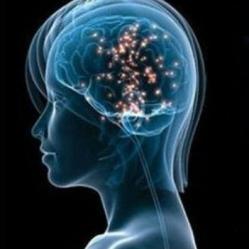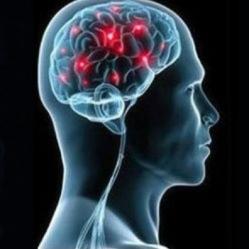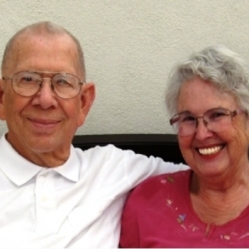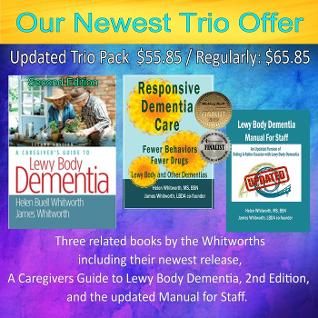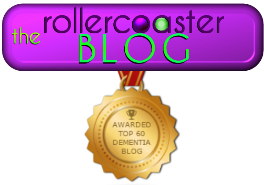
Healthy Living Practices
Healthy Lifestyle Could Reduce Risk Of Dementia, from Newsy Science
These are practices that will help any person live a healthier life. Doing them regularly decreases the risks most dementias and illnesses, including LBD. As a person ages these become even more important. Even after a disorder is present, these practices will help the body maintain build and maintain resources that decrease symptoms.
- Exercise
- Hydration
- Sleep
- Diet and nutrition
Exercise
(3:40 m) Hugh’s Story – Benefits of Exercise, from Alzheimer's Australia SA
Regular physical activity is more helpful with Lewy body disorders than any drug. It increases the oxygen to the brain, decreases depression, and improves balance and grip strength. It also tends to improve sociability and quality of life, and allows people to maintain a higher level of functioning for a longer time. [8]
Physical exercise comes in many forms. It can be done:
- In a rehab gym, as in the video.
- In a group, as with a water aerobics class or a Big and Loud class.
- At home, using a video as a guide or with the care partner.
- Outside, walking with a partner.
- As part of an activity, as with dancing or golf.
Requirements for best results are that exercise is:
- Challenging, but not painful.
- Enjoyable, so that the person will want to continue to do it.
- Regular, at least a half-hour or more at least three times a week. However, any regular amount helps. Find what works for you and make it a part of the weekly routine.
Even a person who is wheelchair bound can exercise, although this usually requires help from the care partner. Active exercise, where a person moves their own body is best, but passive exercise helps too.
Hydration
Dementia Information For Caregivers-The Importance of Hydration, from M.I.N.D. (Moving In Nurturing Directions)
The body is over 50% water. It keeps cells, tissues and organs in good condition, transports nutrients, prevents constipation, and regulates temperature. A person needs more fluids if they are on diuretics (or drinking coffee or alcohol), or if they are losing excess amounts of fluid through fever, sweating, vomiting or diarrhea, or dry humidity.
Symptoms from dehydration can mimic dementia with increased confusion and fatigue. Constipation, muscle cramps, headaches and nausea are also common.
A person with dementia may:
- Forget to drink. Tip: Keep a glass water nearby and/or set a regular schedule when fluid is offered.
- Refuse to drink to avoid urination. Tip: If reasoning is still present, explain that adequate water intake actually decreases urinary trips. If not, set up a regular schedule when a favorite fluid is offered in a pleasant way.
- Be afraid to drink, due to swallowing issues. Tip: Thickened fluids are easier to swallow. A speech therapist can teach ways of drinking that are less likely to cause choking.
Sleep
(3:39 m) Dementia and Sleeping Problems, from DBMAS, Dementia Behaviour Management Advisory Services
This video is about an aboriginal family in Australia, but the issues are suprisingly the same here in the US.
Sleep is the time when the body actively restores and strengthens its resources. An elderly person needs about 7 to 9 hours of sleep a day to function properly. The symptoms from lack of adequate sleep include: less muscle strength, decreased function of vital organs, pain sensitivity, diabetes risks, and a weakened immune system.
Sleep problems are common with all dementias and can start early for those with Lewy body disorders when REM sleep behavior disorder is present. Other causes can be breathing problems, chronic pain from arthritis, stomach upsets, mood problems or an overactive bladder.
The first step is to identify the reason the person isn't sleeping well and do what you can to remedy that. Then, to increase sleep, consider the following:
Non-Drug Options:
- Regular bed and wake schedule
- A relaxing bedtime routine, without any excitement, even if it is enjoyable
- A room used only for sleeping that is dark, quiet and cool
- Avoid drinking caffeine or alcohol within 2-3 hours of bedtime
- Melatonin (a natural hormone), in very small doses may help, about an hour before bedtime may help. Do not use as a sleeping aid in the middle of the night.
- Avoid nicotine, which is a stimulant and can cause insomnia or disrupted sleep.
- Avoid sleeping aids; they tend to be Lewy-sensitive
Diet and Nutrition

Experts say that a Mediterranean diet , high in healthy oils, fish, fruits, vegetables, legumes and cereals, can reduce the risk of dementia.
Once dementia is present, it may also help to lower levels of memory and thinking problems.
There is also some evidence that this diet improves the body's immune system and blood circulation, both important with LBD.
Foods said to boost memory in seniors:
- Leafy green vegetables
- Salmon and other cold-water fish
- Berries and dark-skinned fruits
- Coffee and chocolate
- Extra virgin olive oil
On the flip side, certain foods are said to increase the risk for dementia:
- Processed white foods including pastas, cakes, and white sugar, breads, cakes and rice.
- Processed cheese and meat, including American cheese and bacon.
See the 9/5/13 Rollercoaster blog for more about this diet.
Nutrition
Nutrition refers to the specific nutrients that we need to have healthy bodies. Some have been shown to be helpful with dementia and with the other issues involved with LBD. Experts tell us that , with a few exceptions, getting one's nutrients from food rather than supplements is best. The main exception is Vitamin D, which in the elderly in general tends to be lacking.
These Roller Coaster Blogs are about specific nutrients:
For more information about Whole Food Nutrition and the positive impact for both dementia patients and caregivers, please visit our Alternative Therapies section, Nutrition Therapy by clicking here

A Special Caregiver's LBDtools.com Offer!
This is a $65.85 Value for $55.85
THAT'S A $10.00 SAVINGS!
The Caregivers Guide to Lewy Body Dementia by award winning authors Helen and James Whitworth is the first book to present a thorough picture of Lewy body dementia in everyday language.
Responsive Dementia Care: Fewer Behaviors, Fewer Drugs provides family and professional caregivers with tools for dealing with difficult dementia-related behaviors.
This trio pack is rounded out with the UPDATED Riding a Rollercoaster With Lewy Body Dementia, the Whitworth's manual for caregivers of LBD patients.
Our Site:
Our Site:
Copyright 2014 - 2016: The Whitworths of Arizona - www.lbdtools.com - All Rights Reserved
site design by:





